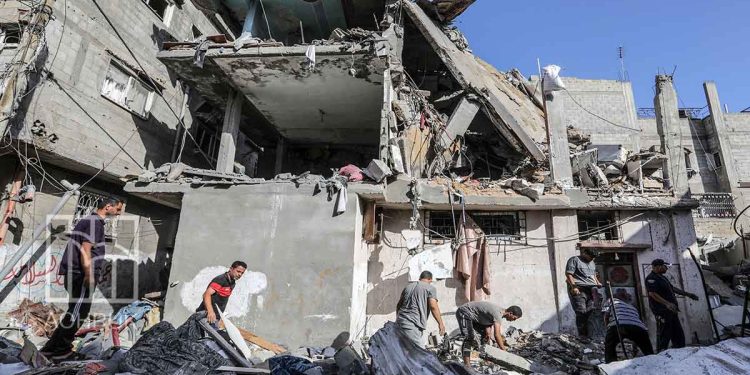The suffering of tens of thousands of Palestinians in the northern Gaza Strip is worsening, as they face a stifling humanitarian crisis that is the worst in years. The situation has been worsened due to the war of extermination waging by the Israeli occupation since October 7, 2023, which systematically targets civilians and infrastructure, leading to destruction of buildings and the displacement of hundreds of thousands of residents.
According to the United Nations, between 65,000 and 75,000 people in areas such as Beit Lahia, Beit Hanoun and Jabalia have been lacking basic humanitarian aid for 66 days, with no access to food, clean water, electricity or healthcare.
The United Nations Humanitarian Coordinator for Reconstruction in Gaza, Sigrid Kaag, described the situation in the northern sector as “absolutely catastrophic”, stressing that the collapse of the legal system and security chaos have made it more difficult to deliver aid, thus making the United Nations and other humanitarian organisations unable to provide basic needs for hundreds of thousands of Palestinians.
Reports indicate that the Israeli blockade has led to the displacement of about 5,500 people from schools that were sheltering them in Beit Lahia, where they moved to Gaza City amid harsh humanitarian conditions.
The United Nations explained that only four bakeries, all in Gaza City, are currently operating to provide bread to the population, which has led to a severe food crisis, especially in the northern areas.
The health situation in the rest of the Strip is no better, as hospitals and medical centres lack the necessary resources, including medicines and basic equipment.
The lack of clean water and electricity also increases the risk of the spread of diseases, which increases the suffering of the population, especially the most vulnerable groups such as children and women.
For its part, the United Nations called on the Israeli occupation authorities to take urgent steps to alleviate the suffering of the population in Gaza by allowing humanitarian aid convoys to reach the northern part of the Strip, opening the Rafah crossing, and allowing the entry of dual-use materials, which include many basic commodities for daily life.
Kaag stressed that international pressure is needed to ensure that the blockade is lifted and aid is allowed into the affected areas. However, the absence of serious action by the international community reflects a failure to address the worsening humanitarian crisis and further complicates the situation.
The continuation of the war and the blockade without international intervention will exacerbate the humanitarian tragedy in Gaza, with disastrous long-term consequences, which requires immediate action to put an end to this war and ensure the delivery of aid to the civilian population, as a first step towards addressing the systematic injustice to which Palestinians in the Strip are subjected.


























